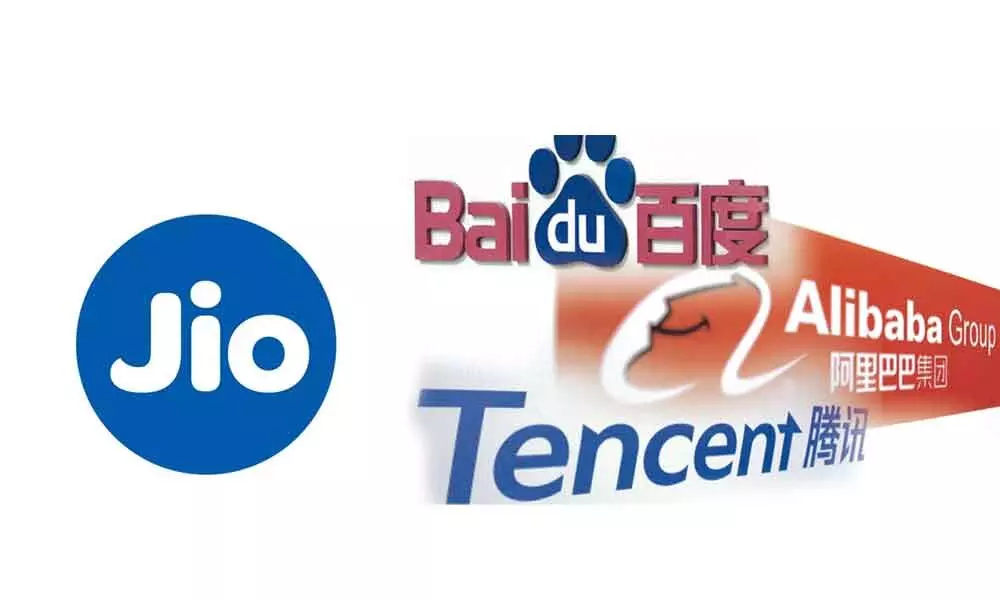Can Indian Cos outsmart Chinese internet giants?

Can Indian Cos outsmart Chinese internet giants?
Chinese online giants Baidu, Alibaba and Tencent, known as BAT companies, are cumulatively valued over $1.3 trillion
Jio, the digital arm of billionaire Mukesh Ambani-owned Reliance Industries, has been on a fundraising spree over the last few months. Between Facebook's $5.7 billion in April to Google's investment of $4.5 billion in July, investment firms already bought over $20 billion worth of stake in Jio. Market talk is that Reliance will potentially imitate China's WeChat model or better it. Others say that it will replicate China's Alibaba model of commerce in India.
It begs the question, what has China done right, that the strong and mighty in the surrounding countries have suddenly woken up to picking up bits and pieces from their internet business strategies. That definitely is a loaded question when it comes trying to understand their success in the last decade and a half.
BAT companies, consisting of Baidu, Alibaba and Tencent, are the most prominent Chinese tech companies at the moment. Their combined value is over $1.3 trillion. Tech companies form a significant part of the Chinese business indices now. Alibaba and Tencent alone now account for almost one-third of the MSCI China Index.
China is now home to 206 unicorns ( privately-owned companies worth at least $1 billion) with a combined value of another $700 billion. About 50 per cent of these unicorns are backed or controlled by the BAT.
It all started with copycat business models of globally successful tech companies. Baidu started as a search company copying Google, Alibaba picking from Amazon and Tencent's flagship WeChat from WhatsApp.
The Chinese government started applying tight domestic restrictions on the US internet companies from doing business in Chinese markets. They got rid of Google and Facebook entirely in 2009 and 2010, clearing away the path for these companies to capture the Chinese markets.
With all due credit to their speed of execution, the BAT companies totally encashed the opportunity presented. They adopted a platform-based strategy to expand vertically and horizontally through major acquisitions and buying equity. BAT gained massive influence over all aspects of the Chinese consumer's life.
In late 2017, the Chinese government unleashed open innovation platforms with Baidu's autonomous vehicles rollout, Alibaba's Cloud initiative for smart cities and Tencent for AI-based medical imaging and solutions.
While BAT continues to feature strongly in China's state agenda, they are also expanding their control to other countries and consumers globally. They invested in over 150 companies, spanning across the internet technologies, Artificial Intelligence and all the way to biotech.
They have also been actively recruiting smart talent from the US, Europe and Israel in areas of predictive healthcare to conversational AI. Today these three Chinese companies have access to data from more internet users than the combined populace of the US and all of Europe. BAT is powered by the largest repository of user data on the planet.
Baidu - China's answer to Google
The company is primarily into search and AI. It does hold a majority interest in iQiyi, China's video streaming platform. Baidu-iQiyi nexus may seem like Google-YouTube, but iQiyi is more of a 'Netflix', a paid service.
Alibaba - China's Amazon
With some caution, one can say the closest thing to online retail platform Amazon in Asia is Alibaba. They do a lot of things differently and cover more in some areas than Amazon today. Alibaba was the second Asian company to cross a $500 billion market cap after Tencent. As of today, Alibaba has the 6th highest global brand valuation in the world.
Tencent – WeChat to games to streaming
The copycat of US model logic breaks down very quickly when it comes to Tencent. In 1998, they launched their business around mobile messaging; they became hugely successful with their ability to pivot the business model around fast growth.
It is one of the largest gaming firms with interest in Riot Games, Epic Games, Kingsoft and Activision Blizzard among others.
Tencent video is the biggest rival to iQiyi in China's space and has stakes in search engine Sogou and e-commerce business JD.com. It owns Chinese social messaging service WeChat.
All this excitement in the Chinese internet and tech space happened in the last 10-15 years. It did not matter where they started and did not matter if their government helped them; they played the game with all they had, and all they could use.
The BAT companies came ahead way beyond anyone imagined, helped their eco-system through technology, finance and opportunity to a load of startup companies around them, making the Chinese internet ecosystem a force to reckon with on global scale.
Looking at this and from where Indian tech space is and the direction we are heading, the question to ask is will our strong and mighty be able to execute like them and or even better them in establishing India as a significant global tech player. With players like Reliance Jio at the helm of affairs and their prowess in raising unlimited smart capital, we are certainly off to a great start.
(The author is Chairman and CEO of Hyderabad-based Brightcom Group)








